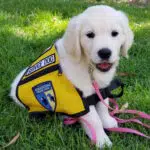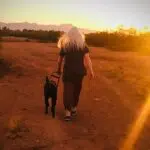Written by Amie Chapman
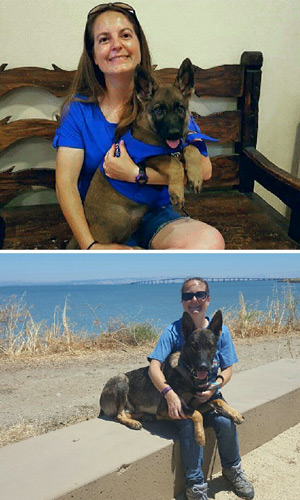
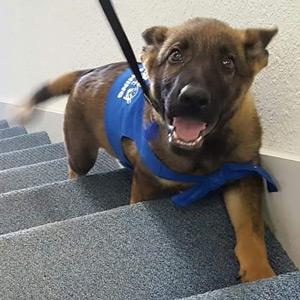
(His second outing at 11 weeks old)
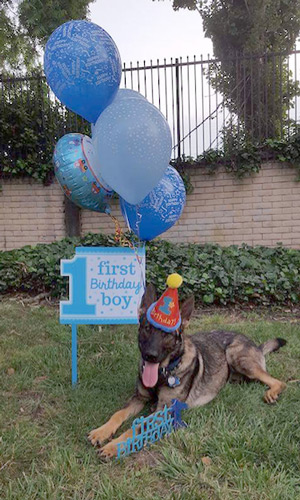
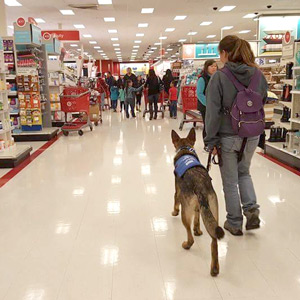
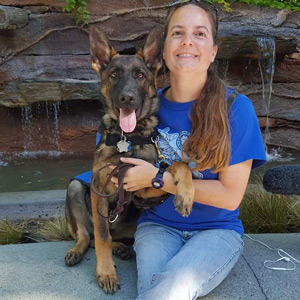
During my time as a puppy raiser there are a few big milestones.
The first full nights sleep without needing to get up to relieve my puppy, their last vaccine appointment where my puppy is no longer at risk of getting certain diseases, their first big outing, growing out of their baby puppy coat, growing out of their baby puppy collar, and losing baby teeth and getting adult teeth. After these milestones the other things don’t seem as big until you reach their first birthday, after that comes the 1 year anniversary of your puppy pick up date. That is when the reality of my puppy no longer really being a puppy, but an adolescent, a dog that is getting close to being the age of heading off to formal training. We have reached this milestone with Patrick.
This week marks the one year anniversary of us picking up Patrick, where in the heck did the time go?
It can’t be a year already . . . can it? It doesn’t seem that long ago that he was just a baby. But the reality is that he is fairly grown up now and he will be off to formal training before we know it. Now we haven’t been told yet when he will be going back for formal training but the usual recall for a shepherd is between the ages of 18-20 months which means we may only have 4-6 left with Patrick, unless he needs more time to mature.
Patrick has accomplished so much in the year that we have had him.
He has mastered public transit, has visited a variety of different types of stores, is amazing at settling when at restaurants, learned basic commands, is completely comfortable in crowded areas, been to theme parks, veterinary conferences, fairs, festivals, movies, traveled throughout California, been through 9 states either via car or airplane (he is amazing going through airport security) and even traveled to Canada. He is a very well socialized guy. But despite all of his accomplishments he has struggle with two major things the entire time that we have had him.
“Our job is to do the best we can to socialize, expose him to real world situations and prepare him for formal training while following the school’s set puppy raising protocols.”
Patrick is still has a major dog distraction issue and at times he has a very hard time walking without a slight pull on his leash.
He has a huge desire to be the leader and really wants to walk slightly ahead of me. He is different in various situations. He struggles the most when we walk with other dogs and they are ahead of him, I think his herding instinct kicks and he has a hard time understanding that not everyone needs to be in a tight little group. Some of the problem is that I am not exactly the tallest person and have a very short stride and, well, he is very long legged and has a pretty big stride. He naturally wants to walk a little faster than I do and he very eager to get moving, he is a dog on a mission. Now I’m pretty confident that he can overcome the slight pulling on leash when he goes into formal training, but the dog distraction is still a major issue and harder to correct.
Patrick has by far been the hardest puppy to raise so far.
He is extremely smart, energetic, stubborn, and driven. These can be great traits for a service dog if he can learn to have some self-control. He is still mentally immature and needs more time to learn self-control. One of the trainers at the school once described to us that shepherds are slower to mature than other breeds. That you can probably take a shepherd puppy’s age in months and divide it in half and you get their mental age. So if you take this equation Patrick is a 7-month old puppy mentally in a 14-month old body with hormones.
When Patrick was a young puppy he struggled with not grabbing toys out of our hands, because he wanted them and lacked self control and discipline to wait for us to give them to him. He would occasionally accidentally grab our hands when going for the toys. It took awhile but he did learn to wait and be patient. With patience, and a lot of guidance he did master this. In fact he even surprised me and made me really proud on our trip to Florida. He was able to play fetch with a 3-year old child. He listened to her commands to drop his toy and wait until she threw the toy for him. Never once tried to grab the toy from her, even though she waved it around right at nose level. That took a lot of self control on his part and it took time to get to that point.
Now the dog distraction issue is a harder thing to achieve.
I have worked really hard with him and will keep working with him on this. Going to group dog training classes, walking him around the dog park, going to dog friendly outdoor malls have all helped in his training. He has made huge improvements, but he still has a ways to go. I’m not giving up on him.
We have been upfront and honest from the beginning about Patrick barking at other dogs.
The response on social media has been all over the spectrum. People have told us that Patrick has absolutely no business being trained for service dog work while others have been very encouraging saying that they too have had shepherd puppies act the same way and with time and training they have grown out of it.
I think a lot of people forget that we are not professional dog trainers.
We are volunteer puppy raisers sharing our journey, the good…and the not so good. It is not up to me if Patrick should or shouldn’t be a service dog, that is for the accredited guide dog school and licensed instructors to decide. Our job is to do the best we can to socialize, expose him to real world situations and prepare him for formal training while following the school’s set puppy raising protocols.
Whether or not Patrick becomes a guide dog is still yet to be determined and mostly up to him.
We will have to wait and see if he can mature mentally enough to handle the stress of guide work and if it is something he enjoys and wants to do. Over the next few months it will be time to continue focusing on his dog distraction issues and fine-tune his basic commands. The unofficial countdown has begun.


